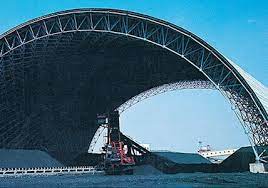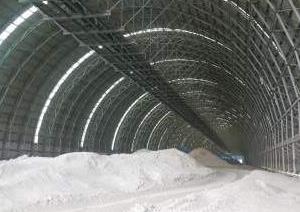Introduction
Gypsum, a versatile mineral known for its role in construction and agriculture, has become a cornerstone in various industries. As the demand for gypsum continues to rise, the need for efficient storage solutions become paramount. Gypsum storage sheds is a revolutionary approach to safeguarding this valuable resource.
Understanding Gypsum Storage Sheds
Gypsum storage sheds are purpose built structures designed to store and protect gypsum in various forms, including raw gypsum plaster and gypsum based products. These sheds offer a controlled environment, shielding the mineral from external elements such as moisture, temperature fluctuation and contaminants.

Purpose behind Gypsum Storage Sheds
The primary objective of using gypsum storage sheds is to preserve the quality and integrity of gypsum throughout its life cycle. Gypsum is highly susceptible to moisture, which can lead to clumping and degradation. The sheds act as a shield, maintaining optimal storage condition and preventing the mineral undergoing unwanted transformation
Moreover, gypsum storage sheds serves as a practical solution for business dealing with bulk quantities of gypsum. These sheds enable efficient inventory management, ensuring easy accessibility and retrieval when needed. Manufacturer, distributor and construction companies benefit significantly from the streamline organization offered dedicated gypsum storage structures.
Changes Experienced after Gypsum Storage Sheds
- Enhance Quality Control: Gypsum, when exposed to moisture or contaminants, can lose its effectiveness and compromise the quality of construction materials. Gypsum storage sheds act as guardians, providing a controlled environment that preserves the mineral’s quality, ensuring that it performs optimally in various applications.
- Increased Efficiency Operations: Businesses involve in gypsum-related activities witness a notable boost in operational efficiency after implementing dedicated storage sheds. The systematic organization and easy retrieval of gypsum streamline processes, reducing downtime and enhancing overall productivity.
- Cost Savings: Gypsum storage sheds contribute to cost savings by minimizing waste. The controlled environment prevents spoilage and ensures that every batch of gypsum remains usable. This not only reduces the need for frequent replenishment but also contributes to sustainable practices in the industry.
- Environmental Impact: Gypsum storage sheds play a role in sustainable resource management. By preventing spoilage and extending the lifespan of gypsum, these structures contribute to minimizing waste and its associated environmental impact.
Conclusion
Gypsum storage sheds represent a forward-thinking approach to resource management in industries relying on gypsum. These purpose-built structures not only protect the mineral but also bring about positive changes in terms of quality control, operational efficiency, cost savings, and environmental impact. As the demand for gypsum continues to grow, embracing innovative solutions like storage sheds becomes not just a choice but a necessity in fostering sustainable practices.
Remember, investing in the right infrastructure today secures a brighter, more efficient future for industries built on the foundation of gypsum.


